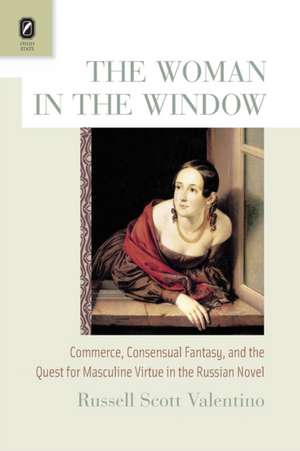The Woman in the Window: Commerce, Consensual Fantasy, and the Quest for Masculine Virtue in the Russian Novel
Autor Russell Scott Valentinoen Limba Engleză Paperback – 31 mai 2016
In The Woman in the Window: Commerce, Consensual Fantasy, and the Quest for Masculine Virtue in the Russian Novel, Russell Scott Valentino offers pioneering new insights into the historical construction of virtue and its relation to the rapidly shifting economic context in modern Russia. This study illustrates how the traditional virtue ethic, grounded in property-based conceptions of masculine heroism, was eventually displaced by a new commercial ethic that rested upon consensual fantasy. The new economic world destabilized traditional Russian notions of virtue and posed a central question that Russian authors have struggled to answer since the early nineteenth century: How could a self-interested commercial man be incorporated into the Russian context as a socially valuable masculine character?
With chapters on Gogol, Tolstoy, and Dostoevsky as well as Pasternak and Nabokov, The Woman in the Window argues that Russian authors worked through this question via their depictions of “mixed-up men.” Such characters, according to Valentino, reveal that in a world where social reality and personal identity depend on consensual fantasies, the old masculine figure loses its grounding and can easily drift away. Valentino charts a range of masculine character types thrown off stride by the new commercially inflected world: those who embrace blind confidence, those who are split with doubt or guilt, and those who look for an ideal of steadfastness and purity to keep afloat—a woman in a window.
With chapters on Gogol, Tolstoy, and Dostoevsky as well as Pasternak and Nabokov, The Woman in the Window argues that Russian authors worked through this question via their depictions of “mixed-up men.” Such characters, according to Valentino, reveal that in a world where social reality and personal identity depend on consensual fantasies, the old masculine figure loses its grounding and can easily drift away. Valentino charts a range of masculine character types thrown off stride by the new commercially inflected world: those who embrace blind confidence, those who are split with doubt or guilt, and those who look for an ideal of steadfastness and purity to keep afloat—a woman in a window.
Preț: 257.89 lei
Nou
Puncte Express: 387
Preț estimativ în valută:
49.35€ • 51.65$ • 41.07£
49.35€ • 51.65$ • 41.07£
Carte tipărită la comandă
Livrare economică 26 martie-01 aprilie
Preluare comenzi: 021 569.72.76
Specificații
ISBN-13: 9780814252871
ISBN-10: 0814252877
Pagini: 186
Dimensiuni: 152 x 229 x 15 mm
Greutate: 0.28 kg
Ediția:1
Editura: Ohio State University Press
Colecția Ohio State University Press
ISBN-10: 0814252877
Pagini: 186
Dimensiuni: 152 x 229 x 15 mm
Greutate: 0.28 kg
Ediția:1
Editura: Ohio State University Press
Colecția Ohio State University Press
Recenzii
“The Woman in the Window manages to cross numerous boundaries with enviable ease. The result is not just intellectually stimulating, but eminently readable.” —Eliot Borenstein, Russian and Slavic studies, New York University
“Provocative and wide-reaching, The Woman in the Window: Commerce, Consensual Fantasy, and the Quest for Masculine Virtue in the Russian Novel seeks out sometimes distant and unexpected contexts in which to reread Russian classics. This point of view is refreshingly original, and these juxtapositions, often not obvious at first, are explained pithily and convincingly.” —David Herman, Slavic languages and literatures, University of Virginia
Notă biografică
Russell Scott Valentino is professor and chair in the Department of Slavic Languages and Literatures at Indiana University, Bloomington.
Cuprins
Introduction • In Search of (Russian) Virtue
-Virtue Unearthed
-The Very Word
-Two Visions of (American) Virtue
-After Virtual
-American Property, Russian Earth
-Virtue as One and as Many
Chapter One • Three Modern Characters: The Double, the Con Man, and the Woman in the Window
-The Speaker’s Ethos
-Characters
-The Amazing Mr. Golyadkin (Junior)
-Gogol’s Man of Confidence
-The Woman in the Window
Chapter Two • The Commercial Ethic in Gogol’s Dead Souls
-Order in the Gallery
-A Commercial Catalogue
-The Advent of Refined Avarice
-Le doux Chichikov and the Worth of a Man
Chapter Three • In Search of the Virtuous Man: Minor Readings
-Divided Man
-Whole Man
Chapter Four • Lara, Lolita, and Other Things that Start with L
-Two Books, Four Movies
-Women in Windows
-Doubles and Heroes
Conclusion • DeLillo’s Cosmopolis and the End of an Idiom
-World City
-Body, Mind, Body
-Property, the Road, and the Confidence Man
-Doubt, the Double, and the Sick Cosmopolitan
-Behind the Kitchen Door
-Virtue Unearthed
-The Very Word
-Two Visions of (American) Virtue
-After Virtual
-American Property, Russian Earth
-Virtue as One and as Many
Chapter One • Three Modern Characters: The Double, the Con Man, and the Woman in the Window
-The Speaker’s Ethos
-Characters
-The Amazing Mr. Golyadkin (Junior)
-Gogol’s Man of Confidence
-The Woman in the Window
Chapter Two • The Commercial Ethic in Gogol’s Dead Souls
-Order in the Gallery
-A Commercial Catalogue
-The Advent of Refined Avarice
-Le doux Chichikov and the Worth of a Man
Chapter Three • In Search of the Virtuous Man: Minor Readings
-Divided Man
-Whole Man
Chapter Four • Lara, Lolita, and Other Things that Start with L
-Two Books, Four Movies
-Women in Windows
-Doubles and Heroes
Conclusion • DeLillo’s Cosmopolis and the End of an Idiom
-World City
-Body, Mind, Body
-Property, the Road, and the Confidence Man
-Doubt, the Double, and the Sick Cosmopolitan
-Behind the Kitchen Door
Descriere
Offers pioneering new insights into the historical construction of virtue and its relation to the rapidly shifting economic context in modern Russia.










